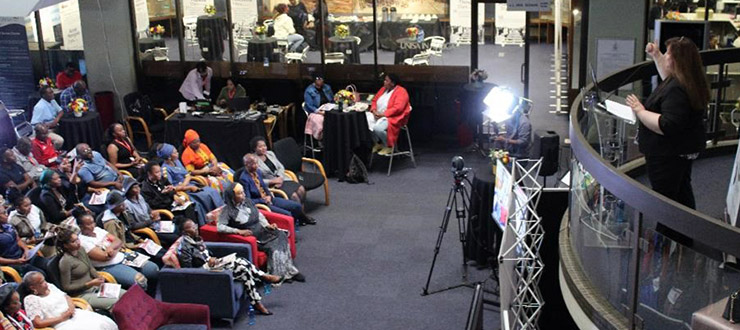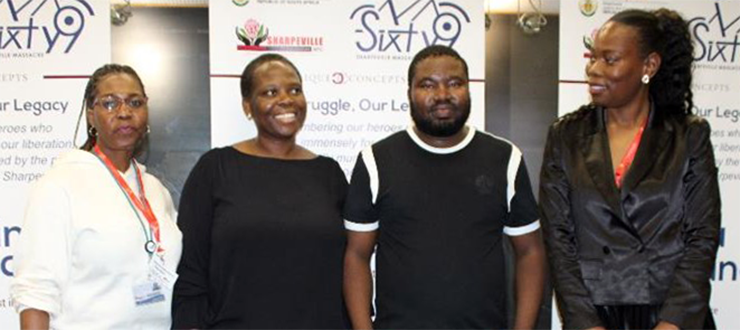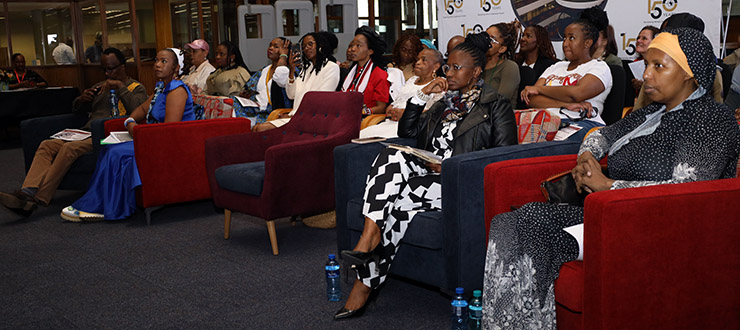
The Department of Library and Information Services, in collaboration with the Department of Information Science, hosted the Voices of Resistance exhibition from 12 to 31 August 2024. On 27 August 2024, a grand talk event was held to honour the crucial, yet often overlooked, contributions of women to South Africa’s liberation and the establishment of the government of which many South Africans have been beneficiaries for 30 years or more along the democratic path.

Prof Lorette Jacobs
The event commenced with profound insights from notable speakers, including Professor Lorette Jacobs, Chair of the Department of Information Science, and Professor Madeleine Fombad, the Senate representative from the same department. Segametsi Molawa, Director of Information Resource Distribution, delivered the curatorial statement, emphasising the importance of the exhibition in the current dispensation. Among the distinguished guests were Kgosigadi Mamohale Moloi, former Speaker of the Sedibeng District Municipality, and surviving eyewitnesses to the Sharpeville massacre. Moloi highlighted the enduring resilience of women in both historical and contemporary political landscapes.
Ntate Nicho Ntema, a Sharpeville memory activist, added to this narrative as he gave a heartfelt recount of the 1960 Sharpeville protests, moving the audience with his personal recollections. His story served as a powerful reminder of the role women played during the fight against the oppressive pass laws of the apartheid regime.

(From left) Kgaogelo Ramosehla, Dr Matlala Mahlatsi, Dr Lethabo Ledwaba, and Itumeleng Mpete
A central element of the event was a poignant tribute to the women who participated in anti-apartheid protests. Tsoana Nhlapo emotionally recalled the names of women who gave their lives in the massacre, stressing the importance of remembering their bravery as individual people, not just as statistics. The exhibition aimed not only to honour these women but also to highlight their pivotal role in resisting oppression. Their contributions, which are often overlooked in many narratives, were instrumental in the eventual downfall of the former regime.
The Voices of Resistance exhibition simplified the complex narratives surrounding the Sharpeville massacre while highlighting women’s significant roles in broader anti-oppression movements. The tragic events of March 21, 1960, when 69 peaceful demonstrators were killed by police, marked a turning point in South Africa’s history. Women were at the forefront of this resistance, demonstrating immense courage in the face of systemic violence. These protest marches marked a turning point in South Africa’s history.
The exhibition further underscored the leadership roles women took on during the liberation struggle. Historically overshadowed by male-led organisations, women played a key role in mobilising communities, often facing imprisonment, severe repression, and even death. Their unwavering commitment to justice and equality left an indelible mark on the nation’s history. This legacy of leadership, sacrifice, and resilience continues to inspire future generations, reminding us of the critical importance of women in South Africa’s fight for freedom.

Women attending the exhibition and talk
Visitors to the exhibition had the opportunity to interact with multimedia displays, featuring oral histories, personal accounts, and book displays that captured the experiences of women during this tumultuous period. A standout reference was also made to Dr Joseph Ngoaketsi’s thesis on heritage commemoration related to the Sharpeville massacre, which offers an academic lens through which to view these historical events.
Beyond the Sharpeville massacre, the exhibition reflected on other notable protests led by women throughout South Africa’s history, such as the 1913 anti-pass law demonstrations and the historic 1956 women’s march to the Union Buildings in Pretoria. These events drew international attention and condemned apartheid, showcasing women’s perseverance in fighting oppressive systems while balancing family responsibilities.
The Voices of Resistance exhibition stands as a vital tribute to the sacrifices made by women in the fight for South Africa’s freedom. It prompts ongoing reflection on the ongoing struggles for justice and equality, encouraging the integration of women’s historical narratives into contemporary discussions on human rights.
The event ended with a heartfelt vote of thanks from Sizakele Nkosi at the Anton Lembede Building Library foyer. A companion exhibition in the Van Schaik Room further solidified Unisa’s commitment to address the challenges facing women today, drawing on the wealth of historical archival materials to continue the conversation.
* By Dr Daniel Mosako, Senior Lecturer, Library and Information Services
0 Comments.